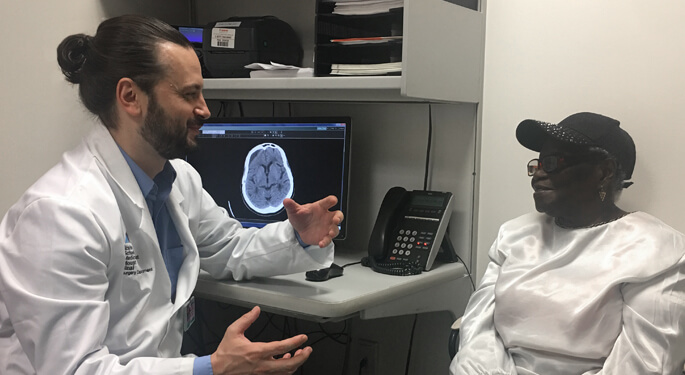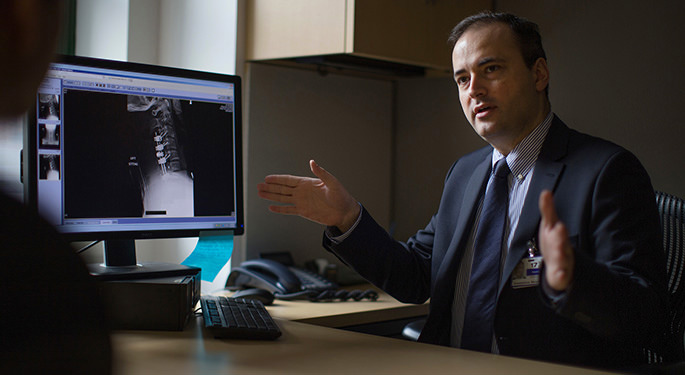Neurotrauma


Neurotrauma is a head or spine injury caused by a sudden injury. It includes concussions, traumatic brain injuries (TBI), skull fractures, spinal column fractures, and spinal cord injuries (SCI). The Neurotrauma Program of the Mount Sinai Health System, Department of Neurosurgery has neurosurgeons whom are specifically trained and equipped to diagnose and treat all types of neurotrauma.
Head Trauma
Head trauma is any injury to your head, from a minor bump on the skull to serious brain trauma. It usually comes from getting hit on the head or skull and can happen if you fall, if there’s a sudden acceleration-deceleration (as in a motor vehicle accident or child abuse) or assault, or if you’re hit by a projectile like a bullet. Head trauma can cause your brain cells to malfunction. The extent of the injury and how long it lasts depends on how badly you were hurt.
We treat the following types of head trauma:
- Concussion
- Mild TBI
- Moderate TBI
- Severe TBI (typically involves a coma)
- Penetrating brain injury (such as gunshot, stab wound)
- Depressed skull fracture
- Craniofacial trauma
- Epidural hematoma
- Acute subdural hematoma
- Subacute and chronic subdural hematoma
- Traumatic subarachnoid hemorrhage
- Traumatic intracerebral hemorrhage/brain contusion
- Traumatic cerebrospinal fluid leak
- Traumatic pseudoaneurysm
- Blunt cerebrovascular injury
Spine Trauma
You can also have an injury to your spinal column (cervical, thoracic, or lumbosacral spine) or spinal cord due to a fall, car accident, collisions with a moving object (such as a car), or an assault. As with head injuries, there are many types of spine trauma, which vary in severity. Depending on what happened, you might become weak or paralyzed. We routinely treat these types of spine trauma:
- Spinal cord injury
- Craniocervical spine injury
- Cervical spine injury
- Thoracic spine injury
- Lumbosacral spine injury
- Atlanto-occipital dissociation
- Jefferson (C1) fracture
- Hangman’s (C2) fracture
- Odontoid (dens) fracture
- Traumatic central cord syndrome
- Perched/jumped facets
- Compression (anterior wedge) fracture
- Burst fracture
- Chance fracture
- Fracture-dislocation
- Traumatic pars defect (spondylolysis)
- Traumatic spondylolisthesis
- Traumatic intervertebral disc herniation
- Complex sacropelvic injury
- Hyperflexion injury
- Hyperextension injury
- Compression injury
- Distraction injury
- Spinal ligamentous injury
Diagnosis
Neurotrauma can occur by itself, or together with other bodily injury. Most people who experience serious injury to their head or spine come to the hospital through the emergency room (ER) and do not schedule appointments or pick their surgeons. When you come to our ER, we immediately evaluate you for head or spine injury, often utilizing a brain scan to give us a clear view of your injuries. Typically, we use a computed tomography (called CT or CAT) scan of the head or spine or we may use magnetic resonance imaging (MRI) instead.
If after you leave the hospital, you have problems with social situations or easy tasks, you should immediately return to Mount Sinai for further examination.
Imaging scans are not always enough to know exactly what is happening in your brain or spine. To diagnose a TBI, we conduct:
- Detailed neurological examinations, which may include a scoring system called the Glasgow Coma Scale. This scale helps us assess the severity of a brain injury by checking your ability to follow directions, blink your eyes, and move your arms and legs. We also take into account whether you’re speaking coherently. Every brain injury is different, but in general, high scores mean milder injuries.
- Cognitive evaluations by a neuropsychologist with formal neuropsychological testing
- Evaluations by physical and occupational therapists
Neurotrauma Treatment
The way we treat head and spine injuries depends on several factors, including the type of injury and how serious it is. Mild injuries may just require careful observation. More severe trauma may call for surgery. Certain types of injuries need surgery, even if they are not very severe.
At Mount Sinai, we also offer neuropsychological therapy, speech therapy, physical therapy, occupational therapy, and rehabilitation medicine, depending on your needs.
We perform the following surgical procedures:
- External ventricular drain placement
- Intracranial pressure monitoring
- Intracranial multimodality monitoring
- Lumbar drain placement
- Bedside subdural evacuating port system placement
- Burrhole for subacute/chronic subdural hematoma
- Craniotomy for evacuation of hematoma
- Decompressive craniectomy
- Cranioplasty
- Elevation of depressed skull fracture
- Cranialization of the frontal sinus
- Complex craniofacial repair
- Traumatic cerebral spinal fluid leak repair
- External bracing for spine injury
- Halo stabilization
- Closed reduction/traction for spine fracture
- Open reduction/treatment for spine fracture
- Spinal decompression
- Instrumented spine stabilization
- Minimally invasive spine instrumentation
- Spinal fusion
- Sacropelvic spine instrumentation and fusion
- Kyphoplasty/vertebroplasty
Most people with mild traumatic injuries to the head or spine end up doing well and many recover completely. Sometimes, though, even after a mild injury like a concussion, you may have symptoms that don’t go away. If this happens, we will continue to work with you.
If you have severe injury, you may require long-term rehabilitation services. The Mount Sinai Rehabilitation Center is one of the top rehabilitation centers in the country, as recognized by U.S. News and World Report. We offer programs for both spinal cord and traumatic brain injuries, which are sponsored by the National Institute on Disability, Independent Living, and Rehabilitation Research.
Research
Mount Sinai neurosurgeons are involved in ongoing research to try to prevent injury to the head and spine, and improve outcomes after injuries. We participate in the American College of Surgeons Trauma Quality Improvement Program as well as several other clinical trials. As a result, our patients benefit from the very latest treatments available.
Our Team
The Neurotrauma Program of the Mount Sinai Health System Department of Neurosurgery includes all MSHS sites and affiliates. The majority of neurotrauma cases that we see come to NYC Health + Hospitals/Elmhurst, our affiliated Level 1 trauma center in western Queens, New York, which is one of the major acute tertiary care hospitals of the New York City public hospital system (the largest in the nation) and a member of the American College of Surgeons Trauma Quality Improvement Project. The Department of Neurosurgery at NYC Health + Hospitals/Elmhurst is directed by Zachary L. Hickman, MD, Assistant Professor of Neurosurgery at Mount Sinai. Two of our neurosurgery residents rotate on Neurotrauma at NYC Health + Hospitals/Elmhurst at all times. Additionally, we have several neurosurgery physician assistants with specific clinical experience in neurotrauma and neurological emergencies.
We also provide trauma care at Mount Sinai Morningside, a Level 2 trauma center on the Upper West Side of Manhattan, directed by Konstantinos Margetis, MD, PhD, Assistant Professor of Neurosurgery at Mount Sinai, Chief of Neurosurgery at Mount Morningside.
Several of our neurosurgery faculty hold positions in or belong to professional organizations and committees devoted to improving patient care, education, and research in neurotrauma.
We work collaboratively with our colleagues in cerebrovascular and endovascular neurosurgery, interventional neuroradiology, diagnostic neuroradiology, vascular neurology, neurological critical care, stereotactic radiosurgery, and neurological rehabilitation.